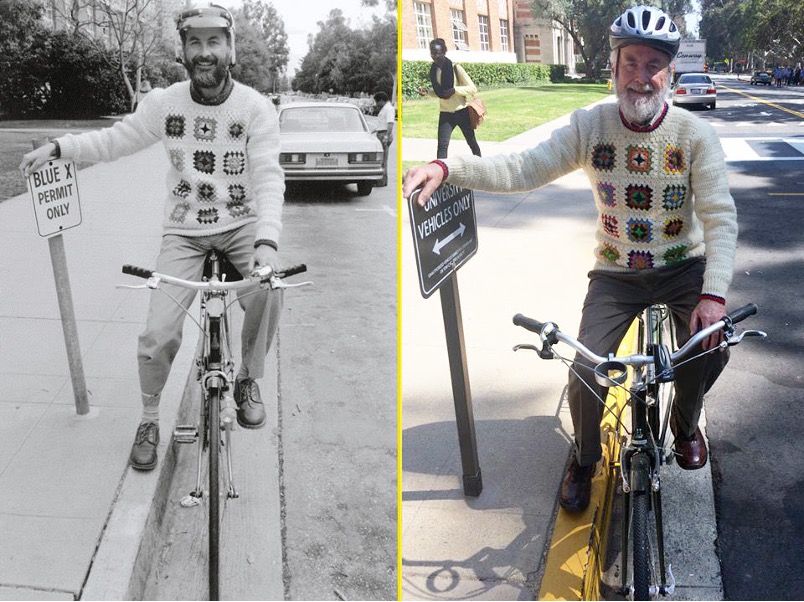This piece is brought to you free of charge courtesy of the paying subscribers to California Planning & Development Report. To become a paying subscriber with access to all of our content, just click here.
The passing of the legendary “parking guru” Donald Shoup has saddened everyone in the world of urban planning – especially former students like me. Don was an amazing guy. As an individual he was unfailingly kind and generous to everybody, although he did have an acerbic sense of humor. As an academic he was rigorous. And of course he changed the way the entire world looks at parking.
It is remarkable, in retrospect, that a quirky guy who had never been a prominent academic became in his later years the object of a cult-like following. He called himself “Shoup Dogg” and his devoted followers called themselves “Shoupistas”. Even when it was unfashionable to do so, I was always proud to count myself among the Shoupistas.
I knew Don for more than 40 years – half of his life and two-thirds of mine, ever since I showed up in his required public economics class at UCLA planning school back in the ‘80s. Our paths crossed innumerable times, most notably around 2010, when as Mayor of Ventura, California, I was involved in the implementation of a controversial Shoupian parking strategy for the downtown area.

Don was proud of the fact that his old student helped bring about change in the real world based on his ideas and the Ventura story gained a lot of currency in urban planning circles, partly because of Don’s great celebrity as a result of his seminal 2005 book The High Cost Of Free Parking– and also the fact that he talked about Ventura endlessly in his speeches and interviews. Our personal relationship was a warm one, and Don often told funny stories about me – some of which were even true. (You can read more about how Ventura implemented Shoupian parking principles in my old mayoral blog here. I go into much more detail about my experience in Ventura and the whole history of relationship with him in the upcoming Routledge book, The Shoup Doctrine.)
But as I have reflected over the past few days about Don’s career and my interaction with him, it dawned on me that, in the end, he wasn’t really about parking. Don was an economist, and his mission was to help people understand the underlying economics of public goods and services. Parking was simply the vehicle, one might say, that he chose to do so.
Whenever anybody asked him how he got so focused on parking, Don always had a funny answer. If you are a public policy academic, the ones who study national issues – the presidency in particular – are at the top of the heap. Far behind were those who study state issues. At the bottom of the barrel, where Don jokingly used to argue he could be found, were those studying local government. (In some cases, local government doesn’t even count toward scholarly achievement in academia.) And among those studying local government, there were two issues nobody ever wanted to touch: parking and sewage.
Don didn’t want to study sewage. So he studied parking.
In later years Don always made fun of my paper on this topic, claiming that it was “just one long sentence,” and when he asked me why, I said, “That’s how I thought economists wrote.” This was not true, but he did grade it very thoughtfully, which I always appreciated. (FWIW, you can find my paper here; let me know if you need access.)
The larger point, though, is that Don was fascinated by the economics of all public services, not just parking. What really led him to parking (other than the fact that it wasn’t sewage) was the fact that it was a classic case of the government giving away something for free or at a below-market price to individuals who benefitted from the giveaway.
Every public parking space has both a cost to the government and a value to individual users. In some cases, the demand for this particular public resource exceeds the supply. As an economist, Don understood that if demand exceeds supply, the supply must be allocated one way or another. For the government, the simplest way to allocate resources is on a first-come, first-served basis. This is how most public commodities are allocated, ranging from housing vouchers (think of the waiting list) to campgrounds (though they often come with a small price tag) to parking spaces.
But Don believed first-come, first-served was not the only way, nor even in many cases the best way, to allocate public resources. There were at least two other ways. The first was to restrict the amount of time that people can use the commodity, which is (supposedly, if enforcement is good) what happens with many parking regimes. And the second is to charge money.
In point of fact, all three are sometimes used in combination. You may have to sign up months in advance for a desirable campground but depending on the location you may pay a fairly hefty fee and you may be able to stay only a certain number of days. I doubt rigorous research goes into the impact of this combination, but it is illuminating to look at it this way.
Now, charging money for a public commodity is a controversial idea. In some cases – housing vouchers, for instance – it’s not a realistic alternative, since the whole purpose of housing vouchers is to give people money to pay for housing. And it’s always very difficult to get people to pay for something they are accustomed to getting for free. But over time, Don came to persuade millions of people that charging for parking owned by the government makes sense.
He did this in two ways. First, he used the supply and demand argument, which is hard to argue with. (Curiously, ideological right-wingers sometimes did argue with it, which I never understood.) But second, as an economist, he understood that when a payment is involved, there’s both a loser and a winner.
In the case of parking, the loser is the motorist who pays (though Don would argue the motorist is a winner because they have access to spaces that would otherwise be occupied by freeloaders).
The winner is whoever gets to spend the money. And Don shrewdly understood that this was a very important question. If the government throws the money into the general fund, never to be seen again, there’s no political benefit to anybody. But if you give that money back to the neighborhood where the paid parking is occurring, you can provide a tangible benefit to that neighborhood – and begin to overcome political opposition to paid parking.
A couple of weeks ago in San Diego, where I live, the city doubled on-street parking fees. Fehr & Peers did do a rigorous parking study for the city which proposed dynamic pricing and extended hours for paid parking (eliminating free parking on Sunday’s for example, and the city is likely to implement those moves in the future. But the doubling of fees occurred simply because the city is trying to plug a big budget eficit.
This is exactly the wrong way to go about things not only economically but politically, because the worst thing you can do is price a public commodity higher just because it’s a cash cow. Don Shoup singlehandedly punched a big hole in that idea. And while politicians will inevitably fall victim to the temptation every now and then, we Shoupistas will always be around to call them out.
If you'd like to learn more about Donald Shoup's ideas and their impact on parking policy, check out my one-hour, on-demand course on parking, eligible for AICP CM credit. (Be sure to click on "Course Info" for a full description. This course has been updated to honor Shoup's passing and expand on his ideas.



